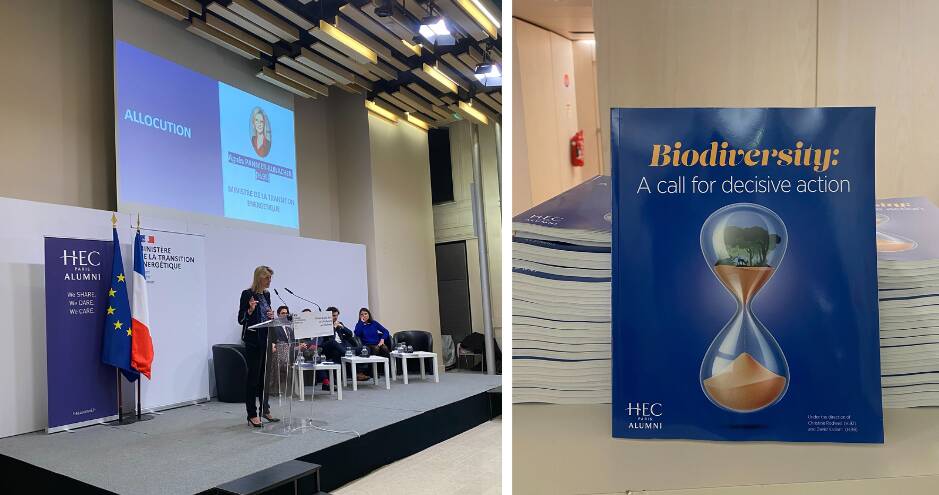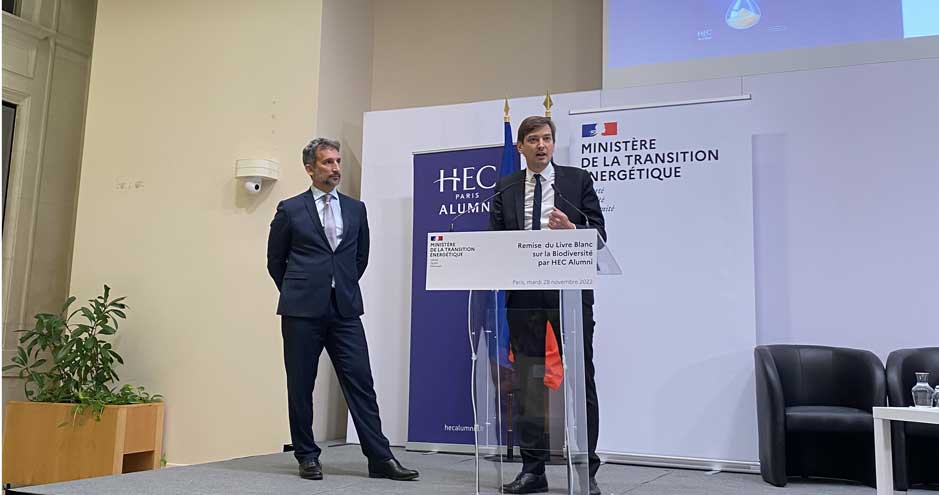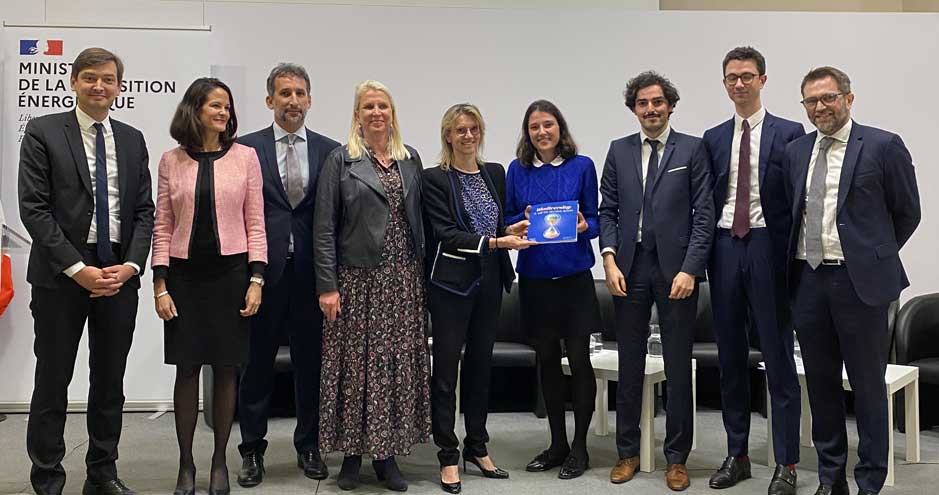French Minister Backs HEC White Paper on Biodiversity
On the eve of COP15 in Montreal, the HEC Alumni Association formally presented the French Minister for Energy Transition, Agnès Pannier-Runacher (H95), with their White Paper on Biodiversity. The publication is an urgent and timely call to the global business community and policymakers to join forces to defend the world’s biodiversity, an essential complement to the fight against global warming. The 129-page paper was co-authored by two senior HEC alumni and five young graduates.

Better late than never. The UN Biodiversity Conference (15th meeting of the Conference of the Parties, COP15) in December aims to adopt a post-2020 global biodiversity framework to provide an ambitious roadmap for the conservation, protection, restoration and sustainable management of the world’s biodiversity and ecosystems for the next decade. Biodiversity, say scientists mandated by the UN, is the foundation of lives, our livelihoods and our cultures. “But we are losing the diversity of life at an unprecedented rate,” they conclude with an ominous sense of urgency.
This long-held observation was the driving force behind a nine-month project by seven HEC alumni, published in June of this year. Their White Paper, “Biodiversity: A Call for Decisive Action”, zooms in on the stakes biodiversity holds for companies of all size. But it also maps out the responsibility of policymakers: “(Their) role will be key in ensuring an orderly transition and avoiding any free-riding,” insist the authors. “In the short term, policymakers need to improve the dialogue among stakeholders by building or supporting forums to promote exchanges.”
Meeting the Minister
Hence, the importance of presenting the report to the Minister for Energy Transition in person. Five months after its publication, they co-organized a solemn meeting at the Ministry for Energy Transition in central Paris, where Minister Agnès Pannier-Runacher, former HEC graduate herself, gracefully accepted the report from the hands of Eliette Verdier (H20) - currently working as a biodiversity consultant at I Care – and her fellow authors.
“I just returned from COP27, which was a deeply frustrating experience since little was achieved to reduce the globe’s carbon imprint,” Pannier-Runacher candidly told the packed auditorium in the Hôtel de Roquelaure which houses both her team and that of the Ministry of Ecological Transition. “But addressing the biodiversity crisis is even more urgent than resolving global warming. Because, if we don’t, as your report so powerfully puts it, it could spell the end of the human race. Your White Paper is an urgent, very well documented, call to action and its quality is felt on every page.”

For Adrien Couret (H07), the question of biodiversity federates the HEC community at all levels. For the President of HEC Alumni the biodiversity challenge is “at least as significant as climate change on living conditions, business models and human life.” At the November 29 event, he insisted the White Paper goes to the very heart of the economy of transition: “Biodiversity is rarely addressed when we talk about the environment. Yet, our 68,000 strong HEC alumni are demanding we explore possible solutions to mitigate its disappearance. This work does just this and I would like to salute the monumental work invested in this research.” At the gathering, co-author Eliette Verdier insisted on the collective effort by authorities at a national level which is needed accelerate a meaningful change: “This Ministry,” she said, “not only needs to lead in educating the population to better understand the environmental impact a lack of biodiversity has. It also has to drive a change in the way we consume. It needs to back and accompany the transformation of those on the frontline and to transform the core values in agriculture, in construction, in energy, and so on.”
Research is the Key
To achieve this, Verdier called on the government to invest more in research. A demand backed by Pannier-Runacher who made a call for more complicity between private and public research. “We also have to revise the status of researchers,” confided the Minister after her half-hour presentation, “especially young academics who need to be rewarded more explicitly than they are at the moment. Finally, we need to prioritize the fields of research and put more focus on topics like bio-based material, green chemicals, low carbon solutions... these have the support of our France 2030 initiative. All these developments need to be given more visibility and business models must be built to give French search a competitive advantage over its rivals. Something schools like HEC can be at the heart of!”
For the co-authors of the report, more cooperation between France’s various ministries needs to be established. “These are messages that must go well beyond the Ministry for Energy Transition,” confided Verdier. “Biodiversity is a subject which concerns all economic activity, not merely the Ministry in charge of addressing it (that of Christophe Béchu): obviously there’s agriculture, but also construction, housing, the chemical industry, and so on. It mean a swathe of actors need to be integrated in solving this crisis for us to advance.”
Wide-ranging Solutions for Industry
The White Paper is divided into two parts. The first half studies the current crisis based on the large scientific literature on biodiversity and its importance for both economies and societies. The second part presents key learnings based on over 40 interviews of company leaders, scientists, NGOs, investors and biodiversity experts, notably from the HEC alumni community. It also maps out eight recommendations to integrate biodiversity into business strategy and practices.
The consequences of the sixth mass extinction that the world is experiencing inevitably has an impact on the strategies that businesses and policymakers take towards biodiversity. This is at the heart of the second part of the White Paper which builds on exchanges with the interviewees to suggest key recommendations. It suggests ways to make up for lost time with a vigorous alliance between business, public authorities and society. “We end the report with a call for action, to be implemented as soon as possible,” said co-author David Vaillant (H98), who teaches sustainable finance at HEC. “There are a dozen pragmatic recommendations for companies to embark on a journey to preserve biodiversity. Now is a time to innovate and adopt measures which are both subtle and impactful, starting with measurements that clarify the priorities. We are not only suggesting technological innovations but structural changes too. And, for this, both dialogue and cooperation within value chains must be promoted.”

Wide-ranging solutions are proposed in the report. They cover an impressive gamut of activities and behavior: from changing society’s agricultural model to transforming consumption habits, reducing waste by simplifying farms upstream, cutting down on the consumption of fish, improving disclosure in the financial sector, involving emerging economies, coalescing with like-minded stakeholders, funding actors to guide SMEs in the transformation; and so much more. As Eric Lombard (H81), CEO of the French Caisse des dépôts says near the end of the report: “For too long, biodiversity has been treated as a “second-rate” urgency when it comes to protecting our planet, with a stronger focus on reducing carbon emissions and climate change. But if we intend to successfully achieve the transition towards a sustainable economy, we must tackle both issues with the same level of commitment.” A plea the UN organizers hope will find an echo in Canada as the COP15 winds up a traumatic year for biodiversity on Earth.
On #BiodiversityDay @COP27P, the HEC Paris community stands together to call upon decision makers to take action for #biodiversity in this global fight against #ClimateChange https://t.co/p2PwsyRQqH @HECAlumni @HECParisSnO #ClimateAction #COP27 pic.twitter.com/qEmOTmlxej
— HEC Paris Business School (@HECParis) November 16, 2022